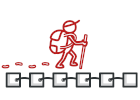Behavioral Design Patterns
Behavioral design patterns are concerned with algorithms and the assignment of responsibilities between objects.
 Chain of Responsibility
Chain of Responsibility
Lets you pass requests along a chain of handlers. Upon receiving a request, each handler decides either to process the request or to pass it to the next handler in the chain.
 Command
Command
Turns a request into a stand-alone object that contains all information about the request. This transformation lets you pass requests as a method arguments, delay or queue a request's execution, and support undoable operations.
 Iterator
Iterator
Lets you traverse elements of a collection without exposing its underlying representation (list, stack, tree, etc.).
 Mediator
Mediator
Lets you reduce chaotic dependencies between objects. The pattern restricts direct communications between the objects and forces them to collaborate only via a mediator object.
 Memento
Memento
Lets you save and restore the previous state of an object without revealing the details of its implementation.
 Observer
Observer
Lets you define a subscription mechanism to notify multiple objects about any events that happen to the object they're observing.
 State
State
Lets an object alter its behavior when its internal state changes. It appears as if the object changed its class.
 Strategy
Strategy
Lets you define a family of algorithms, put each of them into a separate class, and make their objects interchangeable.
 Template Method
Template Method
Defines the skeleton of an algorithm in the superclass but lets subclasses override specific steps of the algorithm without changing its structure.
 Visitor
Visitor
Lets you separate algorithms from the objects on which they operate.